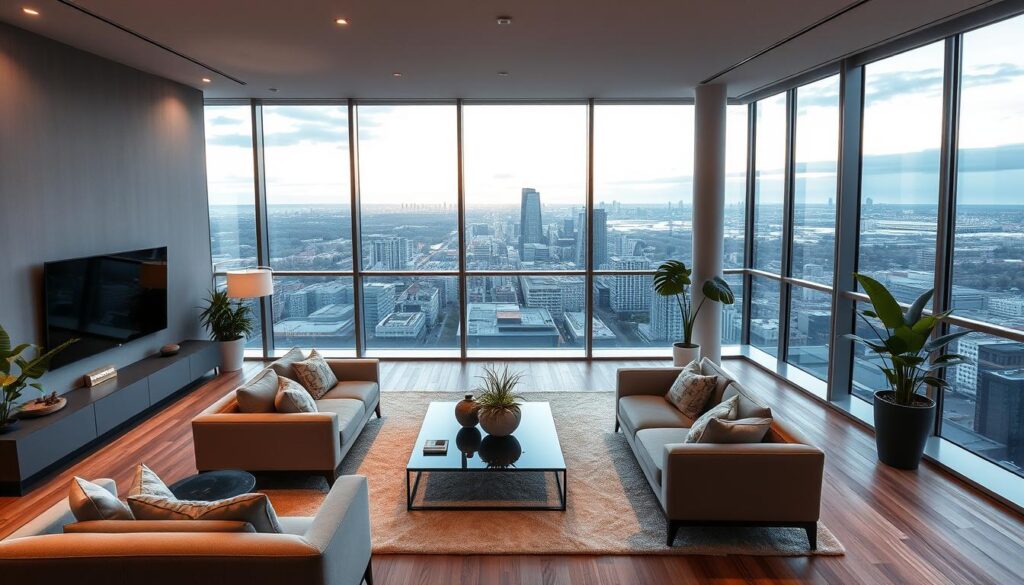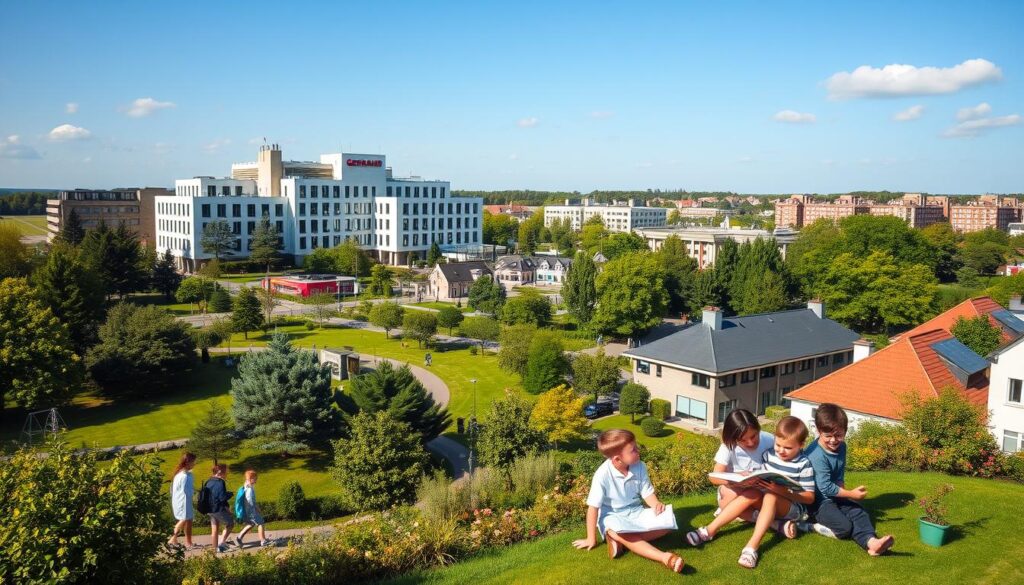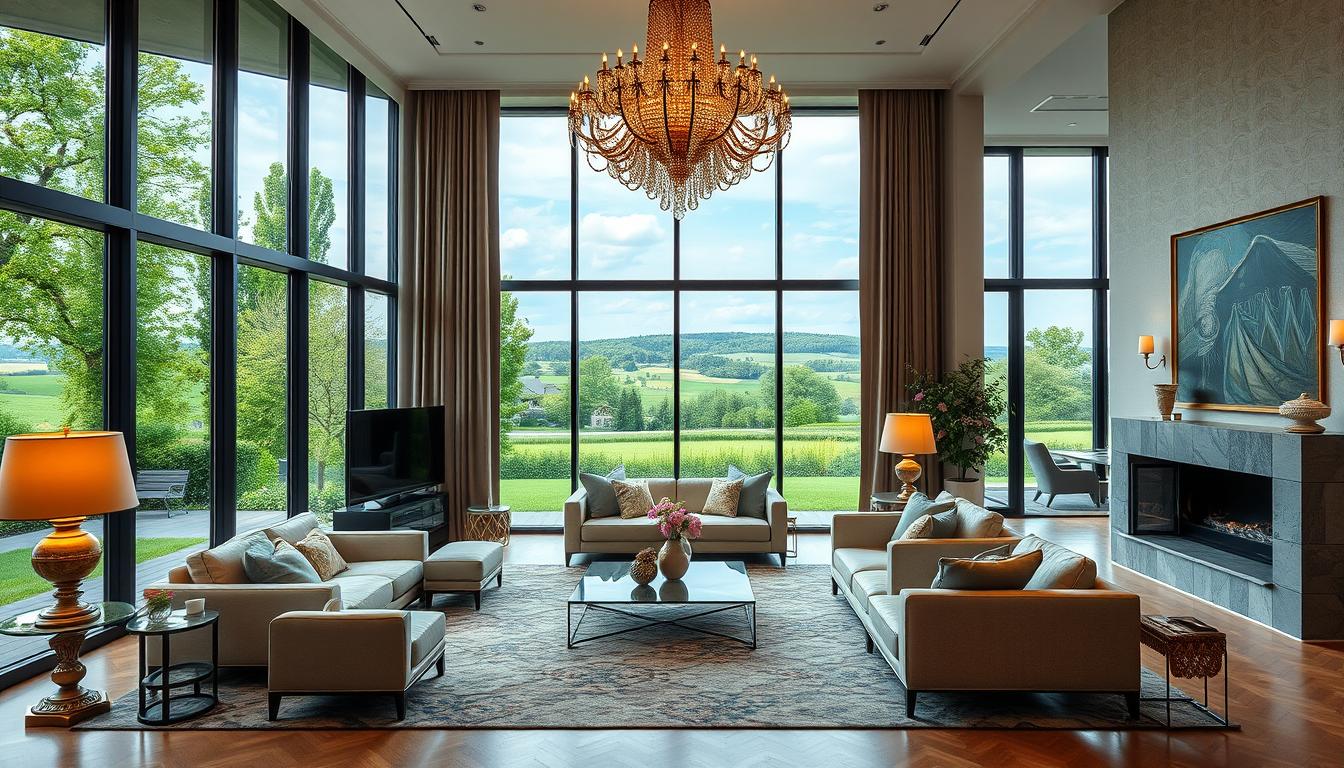Germany is a top spot for luxury lovers, thanks to its strong economy and high quality of life. It’s known for its elegant homes, upscale areas, and great job opportunities. Whether you’re into relaxing in Baden-Baden’s thermal baths or exploring Berlin and Munich’s lively scenes, Germany has something special for everyone.
This article explores the luxury lifestyle in Germany. We’ll look at the best cities and what they offer to those who live there.
Key Takeaways
- Germany offers a diverse range of luxurious living options in major cities.
- Its strong economy provides ample job opportunities for skilled professionals.
- High living costs correlate with significant income potential across the country.
- Healthcare and education systems in Germany are among the best in Europe.
- Sustainable living initiatives enhance the overall quality of life in urban areas.
Introduction to Luxury Living in Germany
Luxury living in Germany combines cultural richness with high-end experiences. Its thriving economy and modern lifestyle offer a unique premium experience. Here, you can find everything from elegant Altbau apartments to modern Neubau buildings, meeting different tastes.
In cities, stylish furnished apartments are popular but pricier. They offer convenience and extra amenities. Rental prices should not be more than a third of your monthly income1. You can find over 1.5 million listings on ImmobilienScout 241.
Luxury living in Germany is more than just homes. Upscale areas offer vibrant communities, great restaurants, and arts. You can even live in lavish villas with private cinemas and chef services, like at Coral Estate2.
Germany is known for its strong community bonds. Residents enjoy high-end services that improve their lifestyle. Living here is not just about homes; it’s a whole lifestyle that’s both enriching and attractive.
Exploring the Luxury Lifestyle in Major German Cities
The luxury lifestyle in major German cities is very appealing. Places like Munich are perfect for those who love luxury. Neighborhoods like Bogenhausen and Grünwald offer top-notch amenities. Munich is home to 130,000 HNWIs and 21 billionaires, making it a top spot for wealth34.
Frankfurt is a key finance hub with 102,200 HNWIs. Areas like Westend and Sachsenhausen are exclusive. It has 16 billionaires, adding to its luxury34.
In Hamburg, Blankenese and Harvestehude are known for their beautiful villas. Hamburg mixes city life with natural beauty, attracting those who value elegance3.
Berlin is now a hotspot for the wealthy. Areas like Charlottenburg and Grunewald are popular. It offers culture and economic opportunities, making it attractive3.
Düsseldorf is gaining popularity, especially in Oberkassel and Kaiserswerth. These areas offer views of the Rhine River. It’s a mix of privilege and beauty, perfect for those seeking exclusivity3.
Lastly, Stuttgart is known for its automotive industry. It attracts wealthy professionals to areas like Degerloch and Killesberg. The city’s high standard of living shows a blend of luxury and innovation3.
Luxuries Live: The Appeal of High-End Living in Germany
The charm of living the high life in Germany comes from its elegant homes and top-notch design. Cities like Berlin and Munich boast a wide range of architectural styles. Each home is a mix of function and style, perfect for those who value both elegance and comfort.
Elegant Living Spaces and Luxury Home Design
In Germany, luxury homes come in many styles. They use the best materials, have smart layouts, and come with the latest tech. For example, in Munich, modern apartments have open spaces and big windows that let in lots of light. These homes also focus on being green, with features that help the environment.
Upscale Neighborhoods in Germany
Germany has many fancy neighborhoods known for their exclusive homes and lively scenes. Charlottenburg in Berlin has old buildings and fancy shops on Kurfürstendamm. Friedrichshain is known for its art and cool cafes. Prenzlauer Berg is loved for its green streets and family vibe, attracting both professionals and families.

Germany’s Strong Economy and Job Opportunities
Germany’s economy is strong, with a big focus on exports, especially in manufacturing. This sector makes up almost 30% of the country’s GDP. It offers many jobs for skilled workers, like engineers in mechanical, electrical, and civil fields5.
The country’s economy is also a big draw for people from abroad. They come to use their skills in Germany’s varied job market.
Key Industries Hiring Skilled Professionals
The automotive, IT, healthcare, and finance sectors stand out in Germany. In places like Frankfurt, there are many jobs in finance and consulting for those looking to grow their careers6. Germany also offers a good work-life balance, with regular hours and plenty of vacation time.
Cultural Diversity and International Work Environments
Germany is known for its cultural diversity, creating a global work setting. This setting encourages teamwork among people from various backgrounds. It boosts innovation and adds to the personal growth of expats.
Job seekers will find a welcoming environment in Germany. The country values cultural inclusivity, helping professionals grow and connect with their communities. This makes Germany’s job market even more appealing5.
| Industry | Key Opportunities |
|---|---|
| Automotive | Engineering, Design, Manufacturing |
| Information Technology | Software Development, Cybersecurity |
| Healthcare | Nursing, Medical Research, Administration |
| Finance | Consulting, Investment Banking, Accounting |
The High Cost of Living and Expenses
Thinking about moving to Germany? The cost of living is a big factor, especially in cities like Munich and Frankfurt. Housing and monthly expenses might seem high, but they’re still lower than in many European capitals.
Cost of Housing in Major Cities
Housing costs in Germany’s big cities are going up. Munich is one of the priciest, with rising median rental prices. A three-bedroom apartment in central Munich costs about €2,500 a month.
On the other hand, Berlin is cheaper, with average rents around €1,500 for the same type of apartment. This shows how important it is to compare housing costs when considering a move to Germany.
Utility Costs and Monthly Expenses
Utility bills in Germany usually cost between €300 to €400 a month. This includes electricity, heating, water, and garbage. It’s key for budgeting your life in Germany.
Remember, you also need to think about food, transport, and fun activities. As living costs in Germany change, keeping up with these numbers is vital for a comfortable life.
Understanding housing and utility costs is key to managing the finances of high-end living in Germany.
Quality of Life: Healthcare and Education Systems
Germany is known for its high quality of life. It has a great healthcare system and a strong education framework. People enjoy affordable healthcare, which makes them feel secure when they need medical help. The healthcare system is top-notch, focusing on being accessible and high-quality.
Healthcare Access and Affordability
In Germany, everyone can get healthcare, thanks to a system that covers most people. This means medical care is affordable for many. The system is also efficient, offering quick and thorough treatments. This makes life better for both locals and expats.
Top International Schools and Universities
Germany’s education scene is lively, with many excellent schools and universities. These places welcome students from all over, offering programs in English. This makes them open to everyone, not just Germans.
Studies show Germany’s education is among the best worldwide. This is especially true for higher education, where international students find great opportunities. The presence of top universities makes Germany a magnet for students looking for quality education.
| Feature | Germany | Comparison |
|---|---|---|
| Healthcare Accessibility | Universal coverage with efficient services | |
| Educational Institutions | Home to top international schools and universities | |
| Cost of Higher Education | Generally low tuition for international students |

Sustainable Living: Public Services and Infrastructure
In Germany, living sustainably is encouraged by public services and green infrastructure. Cities like Berlin and Munich lead the way in making green living a part of daily life. They have efficient public transport, which helps cut down on car use and pollution.
Efficient Public Transport Systems
Germany’s public transport is known for connecting cities well. Smart cities and smart transport systems help move people better and reduce traffic. These systems make public services better and help meet sustainability goals by lowering emissions.
Eco-Friendly Initiatives in Urban Areas
Cities are now using new eco-friendly ideas, like renewable energy in buildings. For example, energy-saving high-rise buildings use up to 30% less energy than old ones9. Using recycled materials in building also helps the environment. Plus, green roofs help with water, add to nature, and increase property value9.
Smart home tech helps people manage their energy better. Electric cars and EV charging stations are becoming more common, making transportation greener10.
Urban areas are also focusing on better waste management and saving water. This makes them not just sustainable but also smart urban systems. The mix of public services and green infrastructure is key to sustainable living in Germany, important for everyone11.
Safety and Security: A Peaceful Living Environment
Germany is known for its safety in Germany. This is thanks to strict laws and public efforts. Buildings have security staff watching over residents all day and night. This makes living in luxury safe and secure12.
Security systems like CCTV cameras and alarms are always watched by experts. This helps keep risks low12.
Gated communities add more security with controlled entry and 24/7 guards13. Cameras and regular patrols add to the safety13. Families love the peace and safety in these areas, where kids can play freely13.
Concierge security makes places feel welcoming and safe. Services like handling packages and managing visitors make living here better12. Properties with these services are more valuable, attracting those who want luxury and safety12.
Luxury amenities like gyms, pools, and parks make living here even better13. This mix of safety and luxury lets people live well in Germany, feeling secure and happy.
| Feature | Concierge Security | Gated Community |
|---|---|---|
| 24/7 Security Personnel | Yes | Yes |
| Surveillance Cameras | Yes | Yes |
| Controlled Access | Managed by Concierge | Yes |
| Emergency Response | Trained Personnel | Limited |
| Community Amenities | Personalized Services | Exclusive Amenities |
Cultural Norms and Customs for Expats
Knowing the cultural norms in Germany makes it easier for expats to fit in. It’s important to understand the traditional values, social behaviors, and how people communicate. In Germany, being on time and speaking directly are key values.
These traits help build strong relationships with the locals. They make living in Germany a better experience.
Understanding German Social Behaviors
Integrating into German society can be tough for expats. Making friends is hard because of the different social cues and customs14. They might feel awkward trying to join local groups.
Language barriers make everyday talks frustrating14. This can make it hard to fully participate in social events.
Tips for Integrating into Local Culture
Expats can find ways to connect with the local culture. Joining clubs, attending events, and doing group activities can help. These steps can lead to lasting friendships, even if they’re uncomfortable at first14.
Learning German is also helpful. It makes social interactions easier and boosts confidence. Embracing local traditions, like sharing meals or celebrating festivals, can also strengthen relationships. It helps understand German culture better.
Family-Friendly Benefits of Living in Germany
Germany is a great place for families, offering many benefits. It has policies that support parents, helping them balance work and family life. This creates a caring environment for families.
Parental Leave and Financial Support
Germany’s parental leave is among the best in Europe. Parents can take up to 14 months of paid leave together. This helps them manage work and childcare.
There’s also financial help, like the monthly Kindergeld. It makes raising kids easier on the wallet. This support is key for a stable home and growing families.
Outdoor Activities and Recreational Opportunities
Families in Germany have lots of fun activities. There are parks, playgrounds, and trails for kids and parents to enjoy. These places are great for outdoor fun and learning.
Going on hikes, bike rides, and exploring nature together strengthens family bonds. Germany’s focus on active living fits well with its family culture.
Germany offers a supportive environment for families and enriches their lives with many experiences151617.
Entertainment and Leisure: Enjoying Luxuries in Germany
Germany’s entertainment scene is vibrant, covering both food and culture. People can dive into a world of fine dining and cultural events. It’s a place where everyone can find something to enjoy.
Dining Out: From Fine Dining to Street Food
In Germany, you can find everything from Michelin-starred restaurants to street food markets. Each city has its own flavors and dining spots. Whether you’re into gourmet street food or fancy restaurants, there’s something for everyone.
Exclusive Events and Cultural Activities
Germany hosts many cultural events all year round. These include art shows, music festivals, and seasonal fairs. Events like Oktoberfest in Munich and the Berlinale film festival draw visitors worldwide. Europa Park in Rust is also a hit with over 100 rides and attractions18.
These events add a lot to life in Germany. They show off local traditions and modern art19.
| Type of Experience | Details |
|---|---|
| Fine Dining | Michelin-starred restaurants, exquisite multi-course meals |
| Gourmet Street Food | Trendy food markets showcasing local and international flavors |
| Cultural Festivals | Oktoberfest, Berlinale film festival, seasonal fairs |
| Theme Parks | Over 100 attractions at Europa Park, great for families |
By exploring these options, people can enjoy Germany’s luxury lifestyle. They can make memories that last a lifetime1819.
The Pros and Cons of Expensive Living in Germany
Luxurious living in Germany offers both benefits and challenges. Major cities have upscale amenities and lively lifestyles. But, the high cost of living and complex bureaucracy can be tough for newcomers.
Advantages of Upscale Living in Urban Centers
Upscale living in Germany is attractive due to its luxury and strong economy. Cities like Munich and Frankfurt have great dining, shopping, and activities. The economy supports a high standard of living, with average salaries around €3,333 monthly20.
For families, living in cities costs about €3,274 monthly. This is a big part of household expenses20. The city’s arts and culture also make it appealing to both locals and expats.
Challenges of Navigating Legal and Administrative Processes
Despite the luxury, dealing with bureaucracy can be tough. Expats often struggle with complex administrative tasks. This can make settling down hard.
The cost of living in Germany is about €2,507 monthly. Housing costs are a big part of this21. Understanding taxes, health insurance, and rental contracts is also a challenge. These complex rules can make living in Germany less appealing.
| Expense Category | Estimated Monthly Cost |
|---|---|
| Single Person Minimum Cost | €966 |
| Family of Four Estimated Cost | €3,274 |
| Average Salary (Net) | €2,675 |
| One-Bedroom Flat (City Center) | €600-€1,000 |
| One-Bedroom Flat (Outside City Center) | €400-€800 |
| Monthly Grocery Cost | €200-€300 |
| Public Transport Monthly Pass | €60-€100 |
| Average Utility Costs | €120-€350 |
The Extravagant Shopping Experience in Germany
Luxury shopping in Germany offers a wide range of options for those who love high-end retail. Frankfurt and Baden-Baden are top spots for luxury shopping. You can find exclusive brands and explore famous shopping districts.
Frankfurt’s Zeil is the best shopping street in the city. It has both high-street outlets and designer boutiques22. Goethestraße is also a must-visit, known for its luxury boutiques and designer stores22.
Famous Shopping Districts and Luxury Brands
Outletcity Metzingen is a great place for luxury shopping, with discounts up to 80% on luxury brands23. It has over 170 luxury, premium, sports, and home living brands. The Shopping Shuttle makes it easy to get there from Stuttgart airport and the city center23.
Baden-Baden adds to Germany’s luxury shopping scene. It has two Michelin-starred restaurants for top-notch dining23. This historic town is also famous for its thermal spas and shopping. The market squares and cultural venues add to the charm and heritage of the area.
Conclusion
Germany’s luxury living is truly captivating, making it a top choice for those wanting a high-end lifestyle in Europe. It boasts a strong economy, excellent healthcare, and top-notch schools. About 70% of people value making their own choices, showing how important freedom is for happiness24.
Germany’s diverse culture adds to the living experience, offering many fun activities that boost mental health. These activities make life more enjoyable and reduce stress24.
Adding nature to city life is key, as it lowers stress by about 20%24. Germany balances work and leisure, promoting relaxation and bonding with family and friends. This highlights the importance of meaningful social connections.
In short, Germany’s mix of culture, economic stability, and lifestyle makes it a prime spot for luxury living. It focuses on quality of life, equality, and personal growth, creating a vibrant and welcoming society25. Moving to Germany means finding a place full of opportunities and luxury.
